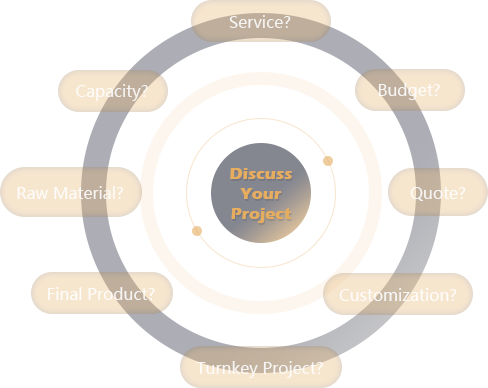Cat litter production line is an industrial manufacturing system specially used for producing cat litter products. Through a series of continuous production processes and mechanical equipment, raw materials are processed into finished cat litter products that meet market demand. The production line is usually composed of raw material pretreatment equipment, molding equipment, drying equipment, screening equipment, packaging equipment, etc. The raw material pretreatment equipment is responsible for crushing and stirring various raw materials such as bentonite, sawdust, tofu raw materials, etc.; the molding equipment processes the processed raw materials into specific shapes, such as extruding into strips, balls, etc.; the drying equipment removes moisture from the cat litter through heating devices such as hot air furnaces to ensure product quality and storage period; the screening equipment screens out cat litter particles of unqualified size; finally, the packaging equipment quantitatively packages qualified products. Under the deployment of the automatic control system, the entire production line achieves efficient and stable production to meet the large demand for cat litter products in the pet products market.
Applicable materials
According to the type of raw materials and process characteristics, it is mainly divided into the following three categories:
1. Mineral cat litter production line
Bentonite: mainly sodium-based bentonite, with strong water absorption and expansion, and easy to agglomerate. Sodium carbonate (enhanced adsorption), potassium permanganate (sterilization), and water glass (increase polymerization force) need to be added to assist granulation. After drying and dehydration to ≤6% moisture content, it is naturally cooled to 6%-8% to avoid moisture absorption and agglomeration.
2. Plant-based cat litter production line
Corn starch: It accounts for 20%-40%, provides basic water absorption and agglomeration skeleton, and needs to be matched with pre-gelatinized starch to reduce dust. High-quality corn starch must meet the standards of white color, uniform and fine particles, and high purity.
Cassava starch: The starch content reaches 70%-80% (higher than corn starch), the water absorption rate is increased by 30%, the agglomeration is tighter and not easy to stick to the bottom. The proportion of branched starch is high, and a tight network structure is formed after absorbing water, giving the cat litter a "beach-like" delicate foot feel.
Bean dregs/plant fiber (tofu cat litter): Food industry waste (such as pea dregs, soybean dregs), which needs to be dried and crushed before use. Add corn starch (15%-20%) and guar gum (1%-2%) to enhance agglomeration. Extrusion and expansion molding, low-temperature drying at 60℃ for 12 hours to prevent mildew, and the dust rate of the finished product is ≤1%.
3. Mixed cat litter production line
Bentonite + plant-based: supports custom proportions of mixed minerals and plant-based raw materials (such as bentonite + tofu dregs), and achieves performance optimization through composite processes.
Use a segmented granulator, bentonite and plant fiber layered granulation, and a multi-layer vibrating screen to accurately separate particles of different sizes.
The cat litter production line aims to realize the automation and standardization of cat litter production. First, the raw materials such as bentonite and sawdust are crushed and mixed for pretreatment, and then extruded or granulated. Then, the hot air furnace is used for heating, and the water is evaporated through the drum or fluidized bed drying equipment to reduce the moisture content of the cat litter. Then, the vibrating screen is used to screen out qualified particles according to the particle size, and the unqualified products are returned to the furnace for re-processing. Finally, the products are automatically weighed and heat-sealed and packaged. Each link is precisely controlled by the PLC system to ensure efficient and stable production.
Process flow
1. Raw material ratio: Corn/cassava starch (40%-70%) is used as the basic water-absorbing material, pre-gelatinized starch (20%-40%) provides adhesion, guar gum (1%-2%) is used to enhance the particle strength, activated carbon (1%-3%) is added for deodorization, and mesoporous materials (2%-4%) are added to improve the odor adsorption efficiency.
2. Puffing process: The screw extruder is heated to 160°C to break the hydrogen bonds of the starch molecules and gelatinize to form a porous structure.The moisture content of the raw material is 15%-25%, the extrusion time is ≤5 seconds, and the particle density is reduced by 30%-40% after puffing.
3. Granulation: The twin-screw extruder is formed through a mold, and the particle diameter is 2-6mm and the length is 5-20mm. The pre-gelatinized starch gels when it encounters water, and forms a stable network structure after cooling.
4. Drying and dehydration: The drum dryer is suitable for large-scale drying of various cat litter raw materials such as bentonite, slag, and sawdust, and the moisture content is reduced from 16% to below 8%. Microwave drying is mostly suitable for tofu cat litter, which has a sterilization function and can extend the shelf life by more than 30%.
5. Screening and cooling: The vibrating screen removes dust <0.15mm (concentration ≤5mg/m³), and the proportion of qualified particles is ≥95%. Naturally cool to room temperature to prevent starch particles from absorbing moisture and rehydrating.
6. Packaging, storage and transportation: Sealed packaging, automatic packaging machine is filled with nitrogen to prevent moisture, and the water activity (Aw) is controlled below 0.65.






























